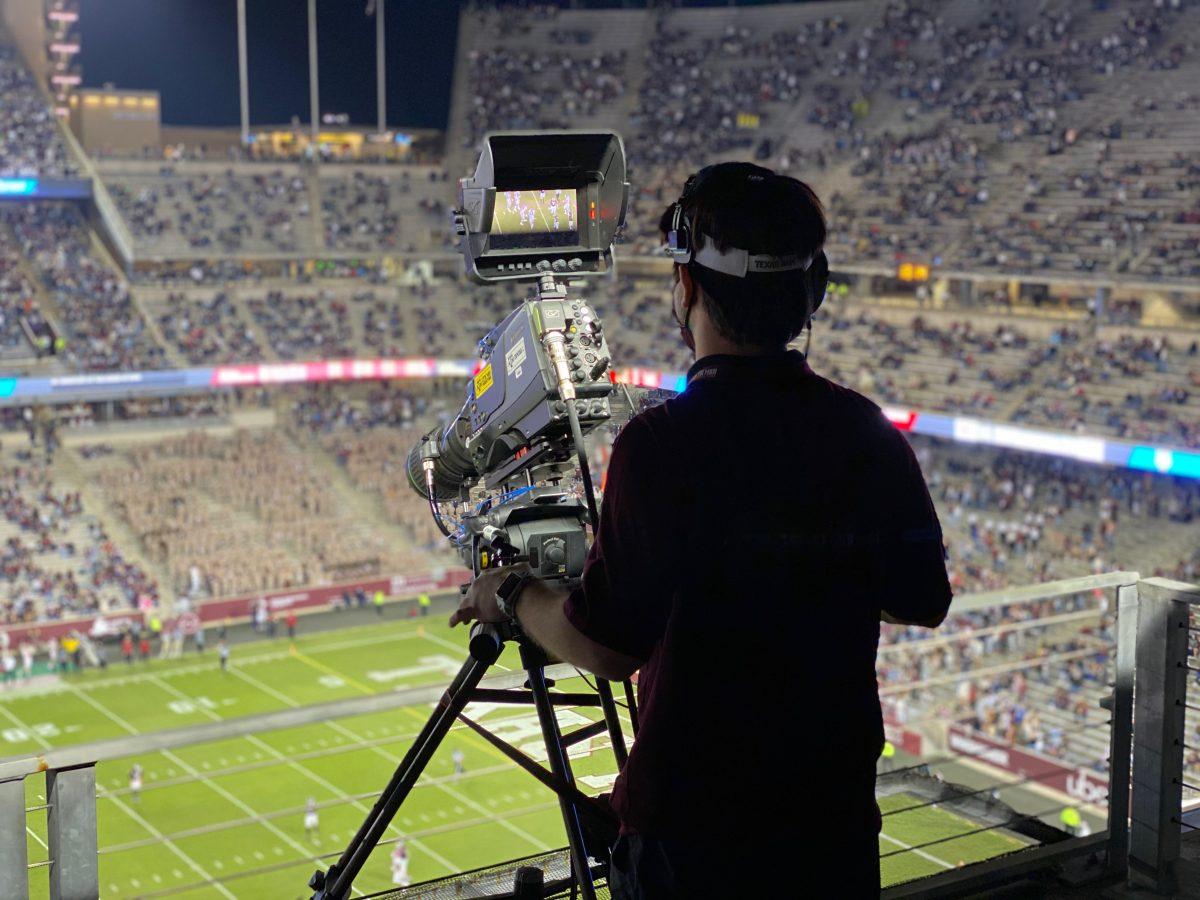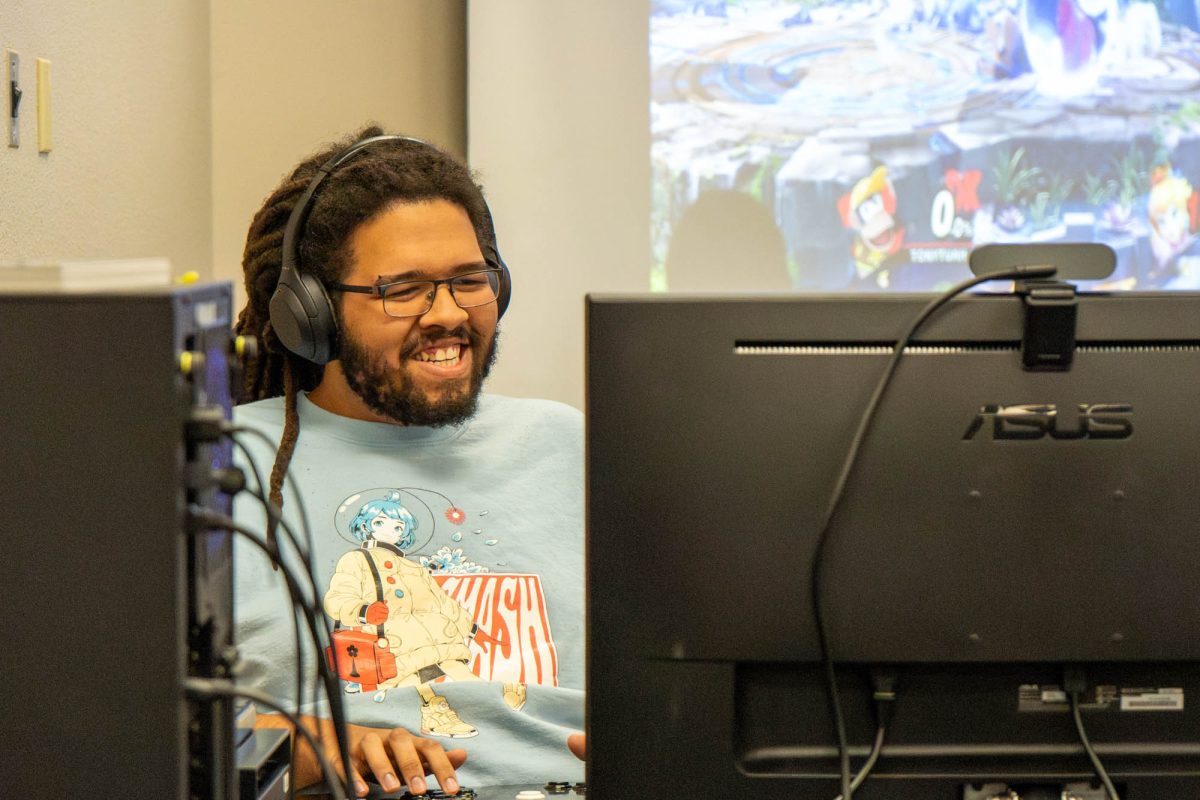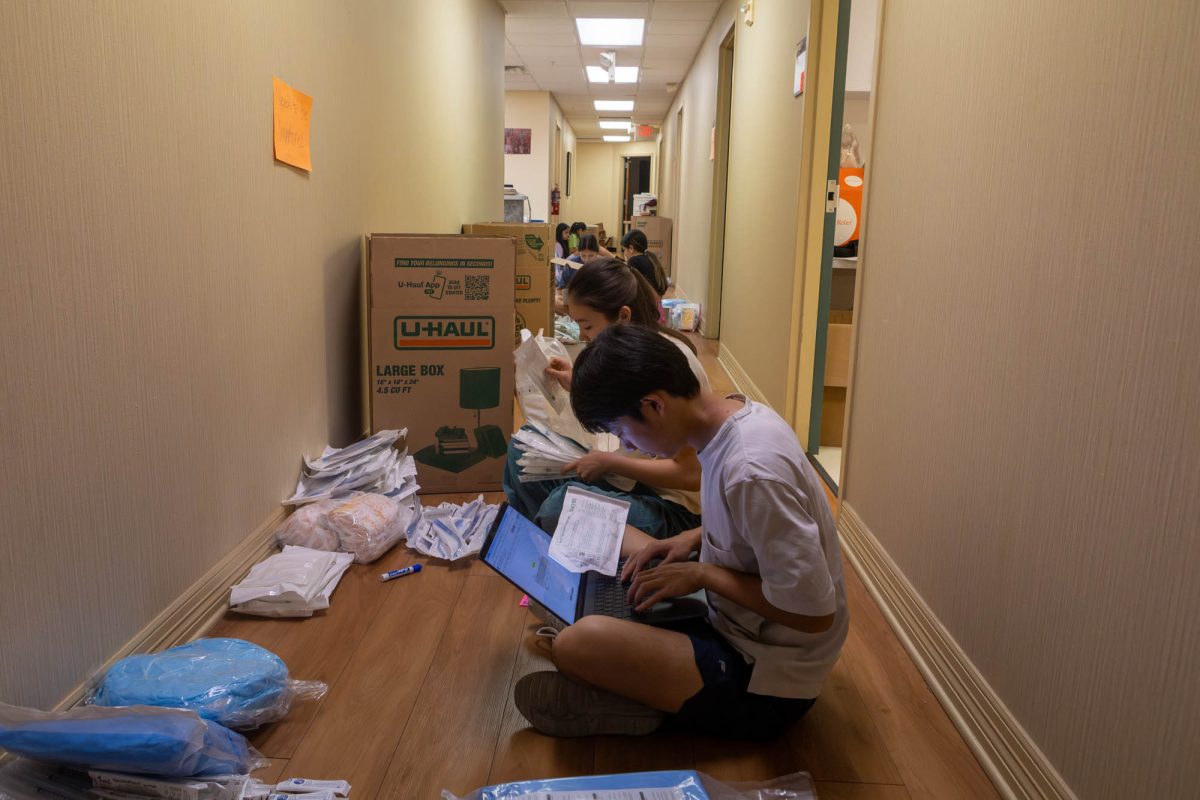For Aggies around the country, it’s easy to watch their favorite teams play: turn on the TV and go to the channel the game is on. However, the production behind this is not so simple. A lot of effort and time goes into preparing and executing a broadcast. For A&M, home games are broadcasted by 12th Man Productions. The director of broadcasts for 12th Man Productions Justin Argo, along with the aid of his coworkers and student workers, produces the sports Aggies all over the country consume and love.
Argo, Class of 2008, worked for 12th Man Productions while studying at A&M. Upon graduation, Argo moved to Colorado, where he worked with FOX Sports for 10 years before deciding with his wife to return back to College Station in 2017.
The opportunity to return home and help out future Aggies with aspirations in broadcasting was important, Argo said.
“We heard about 12th Man Productions and how they were expanding and growing [with] all the stuff they were doing with ESPN and SEC Network,” Argo said. “It was kind of a way to help my alma mater and the future generation with how to do broadcast television.”
Argo said he considers his job as a mentorship because of the nearly 100 student workers under his supervision.
“I look at my job right now as kind of being a football coach,” Argo said. “I’m working with college students right now. If I’m lucky I’ll get a star freshman that’ll play for four years, but for the most part we’re playing juniors and seniors.”
What’s key for him, Agro said, is ensuring 12th Man Productions consistently improves and produces a great product year after year.
“We’re trying to build a dynasty,” Argo said. “Just [because] these seniors left [doesn’t
mean] you’re not going to be successful [in the future]. You hand the baton off, and it’s the next level. [Each] year we try to get better and [improve] our shows from the year before.”
Argo said working with students is the best part of his job, he said.
“[Students] come in, first couple of shows they’re like a deer in headlights — just kind of terrified,” Argo said. “They’re nervous and don’t know what to expect. Then they get some reps in and they’re learning. They get [to] a level where they’re on national television and doing a really good job, giving each other fists bumps as we go to break because the [show’s flowing] really [well]. Seeing them grow and develop is my favorite part of the job.”
Elissa Killebrew, broadcast operations supervisor for 12th Man Productions, said relying on students can make live broadcasts more challenging.
“The product we want to put out is so high level because we’ve had so many years of experience, but we’re constantly having to train kids and put students in positions where maybe they’re not exactly ready,” Killebrew said. “We just have to hope they emerge and grow in that position. Sometimes we fail and we have a subpar broadcast that we’re very disappointed in; sometimes we succeed with flying colors.”
However, Killebrew said fighting through those challenges can lead to some truly rewarding experiences.
“We are really nurturing these students in [both] their personal and career lives,” Killebrew said. “The ultimate payoff is seeing students graduate and go on to be successful in the industry.”
Argo said a great example of this success was the Jan. 19 men’s basketball game against Kentucky.
“When we did the men’s basketball game versus Kentucky, it was a big prime-time matchup on SEC Network and there were 14,000 [fans] at Reed Arena,” Argo said. “I remember looking around the control room thinking, ‘It’s pretty cool that some of these kids are 19 and 20 years old and they’re doing this.’ The show went really well. It was cool for me to see them [go] from not knowing anything, to producing at a high level that meets the standard of ESPN.”
Since sports are volatile and don’t follow a script, Argo said the job can be difficult for him and his coworkers.
“[You] come in and think it’s going to be player A versus player B,” Argo said. “This is the matchup, then something happens and someone gets hurt. From a live event standpoint, you do all your research and come in prepared for a show to tell your [story]. You always have to be prepared for the unexpected.”
However, Argo said the volatility can result in incredible games. A perfect example, he mentioned, was when A&M football upset No. 1 Alabama in October of 2021.
“Right when you think you know what’s going to happen, something crazy will happen,” Argo said. “Like the Alabama football game, the Aggies were kind of struggling, and then they [came] in, and we have the most magical moment I can think of event-wise. That was really cool to be a part of. [Seeing] everyone storm the field. When I came into work that morning, I didn’t know it was going to be that kind of day [and have] a last-second field goal to beat the No. 1-ranked team in the country. It’s unscripted storytelling and it’s exciting.”
This is why Tyler Honeycutt, senior broadcast producer and editor for 12th Man Productions, said communication is key to being successful.
“Working in live television, you never know what’s going to come next,” Honeycutt said. “Just being able to react quickly [and] having a game plan. With all that going on, we have a crew of 20-30 people at most of the events that we work, so whenever those things do come up, just being [an] effective communicator is the most important thing for a successful show.”
Argo said he learned a lot from his time working in Colorado, communication skills being chief among them.
“[I learned a lot about] treating people the right way and working as a team,” Argo said. “That’s something I’ve tried to bring over here, and we have a good team here, too. There’s a lot of collaboration that goes on whenever you’re doing these broadcasts. Just treating people with respect and the way you want to be treated [and] communicating well. That’s been a big part of the culture I try to instill over here.”
In Colorado, Argo won seven Emmys and an individual Emmy. He said the Emmy he was most proud of was for a high school broadcast because of the competition it was up against.
“The one that meant the most to me was [when] we had a high school football broadcast that beat out several other professional teams,” Argo said. “That was pretty cool and [meant] a lot to me because we put a lot of pride into that show even though it was a high school football broadcast. The other people that were submitting stuff were [from the] NHL, NBA and MLB teams. We beat out those teams that year with a high school football broadcast.”
Killebrew said Argo’s best attribute is his ability to lead by example. The culture he has created is required due to the time commitment in the field of broadcasting.
“[Justin] is definitely my favorite boss and favorite mentor because he’s the type of person that makes everyone want to be better,” Killebrew said. “He’s really good at leading and [setting] an example. He focuses a lot on culture, which in our industry is super important because we’re working nights, weekends and holidays.”
During the events, Argo’s presence has a calming effect on the crew in what can be a stressful atmosphere, Honeycutt said.
“[Argo] carries himself very well,” Honeycutt said. “Whether it’s just around the office talking with other people or actually in the producer chair during a broadcast or big screen show. He’s always cool, calm and collected in the chair. You can always look to him and he’s able to guide the ship and do it in a manner that is effective [while] everyone around him is having fun.”
Much like the rest of the world, COVID-19 changed the way 12th Man Productions operated. Previously, ESPN would send producers to assist with the broadcast.
“Traditionally, when I took this job, ESPN would send in a couple of [their personnel], including the announcers, onsite to help produce, direct or make graphics,” Argo said. “We got to a level right before the pandemic where they stopped sending as [many] people to our venues. It was more on us to do it.”
Due to restrictions keeping ESPN from sending personnel, more of the onus of producing the broadcasts was put on 12th Man Productions. The experience changed the organization for the better, Killebrew said.
“I feel like last year was kind of a turning point [for] 12th Man Productions but also in the sports television industry,” Killebrew said. “ESPN lost so much money and couldn’t send people because [of] Disney[‘s] guidelines. We were having to do productions where the talent was at their own house and they were calling the game through our production facility. [It] changed the industry completely. It saved ESPN a ton of money but it also generated more revenue for us and all the other schools involved in the SEC and ACC network.”
This led to ESPN expecting other schools to do the same. Thus far, there have been mixed results, Killebrew said.
“Every school involved in those ESPN networks is having to do their own productions on-site with no ESPN help,” Killebrew said. “There [are] some schools that can’t do what we do, but for the most part they’re wanting the schools to be more independent with their broadcasts.”
Killebrew said, during a broadcast, it’s important to be as perfect as possible. It’s one of those situations in which you aim for the stars but land on the moon.
“Someone told me a long time ago you’re only as good as your last broadcast,” Killebrew said. “On the other side of that, I’ve also been told you can never have a perfect broadcast. You’re always trying to aim for perfection and hope you don’t miss it by too much.”
Argo eventually wants to give students the opportunity to potentially learn more about the industry in an academic setting.
“I’ve been working on trying to tie this into academics a little bit more, where students can get course credit or learn this in a classroom,” Argo said. “I studied telecommunication media studies when I was in college, but there really wasn’t something this specific in video production to study.”
Remaining among the elites in student broadcasting is important for Argo. This means 12th Man Productions needs to be continuously trying to keep up with an ever-changing industry.
“[We want to] have [the] standard of being one of the best, if not the best, control room in the country for ESPN,” Argo said. “[We’re] finding different ways to push the envelope and make [our product] better year after year.”
Bringing A&M sports into your living room
April 6, 2022
Photo by Provided
12th Man Productions employs over 100 student workers, broadcasting all home Texas A&M sporting events.
0
Donate to The Battalion
$2790
$5000
Contributed
Our Goal
Your donation will support the student journalists of Texas A&M University - College Station. Your contribution will allow us to purchase equipment and cover our annual website hosting costs, in addition to paying freelance staffers for their work, travel costs for coverage and more!
More to Discover









